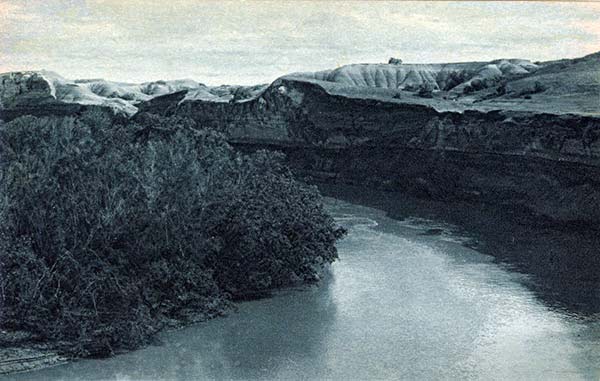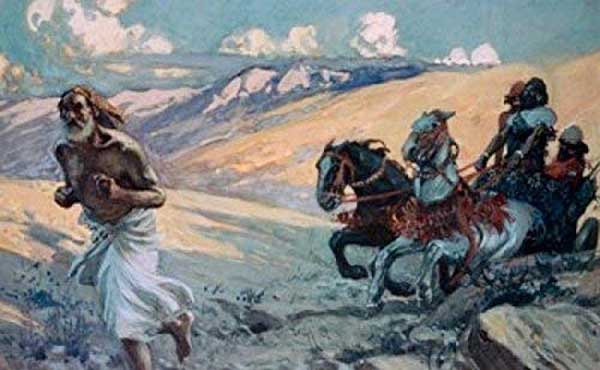
The mountains of Gilead behind the River Jordan (Eretz Israel - Palestine).
Photo: S. Narinsky.
No. 27, Published & Copyright by Jamal Brothers, Jerusalem, Israel, 1921.
The National Library of Israel.
Jerusalem, Israel.
There has been widespread confusion over the years as to the correct answer to a very famous question in scripture, namely, the question posed by Jeremiah in Jeremiah 8:22: Is there no balm in Gilead?
Jeremiah 8:21 For the hurt of the daughter of my people am I seized with anguish; I am black, appalment hath taken hold on me. 22 Is there no balm in Gilead? Is there no physician there? Why then is not the health of the daughter of my people recovered? 23 Oh that my head were waters, and mine eyes a fountain of tears, that I might weep day and night for the slain of the daughter of my people! (JPS) (Emphasis added)
Hosea 6:8 Gilead is a city of them that work iniquity, it is covered with footprints of blood. 9 And as troops of robbers wait for a man, so doth the company of priests; they murder in the way toward Shechem; yea, they commit enormity. (JPS) (Emphasis added)
Isaiah 1:4 Ah sinful nation, a people laden with iniquity, a seed of evil-doers, children that deal corruptly; they have forsaken the Lord, they have contemned the Holy One of Israel, they are turned away backward. 5 On what part will ye yet be stricken, seeing ye stray away more and more? The whole head is sick, and the whole heart faint; 6 From the sole of the foot even unto the head there is no soundness in it; but wounds, and bruises, and festering sores: they have not been pressed, neither bound up, neither mollified with oil. 7 Your country is desolate; your cities are burned with fire; your land, strangers devour it in your presence, and it is desolate, as overthrown by floods. (JPS) (Emphasis added)
Despite far-reaching misinterpretation of the matter, the correct answer to this question is actually NO; THERE IS NO BALM IN GILEAD.
Micah 1:9 For her wound is incurable; for it is come even unto Judah; it reacheth unto the gate of my people, even to Jerusalem. (JPS) (Emphasis added)
Jeremiah 30:12 For thus saith the Lord: Thy hurt is incurable, and thy wound is grievous. 13 None deemeth of thy wound that it may be bound up; thou hast no healing medicines. 14 All thy lovers have forgotten thee, they seek thee not; for I have wounded thee with the wound of an enemy, with the chastisement of a cruel one; for the greatness of thine iniquity, because thy sins were increased. 15 Why criest thou for thy hurt, that thy pain is incurable? For the greatness of thine iniquity, because thy sins were increased, I have done these things unto thee. (JPS)
Jeremiah 46:11 Go up into Gilead, and take balm, O virgin, the daughter of Egypt: in vain shalt thou use many medicines; [for] thou shalt not be cured. (JPS) (Emphasis added)
Lamentations 3:42 We have transgressed and have rebelled; Thou hast not pardoned. (JPS) (Emphasis added)
The word balm actually means a remedy or something that heals. There is no remedy for this predicament whatsoever. The wound is incurable; therefore, it really does not matter whether there is a balm or physician in Gilead or any other place. Be aware that when considering this question, one must keep in mind the exact period, people and circumstances of which Jeremiah is speaking. Jeremiah is speaking directly to Israel.
Isaiah 1:2 Hear, O heavens, and give ear, O earth, for the Lord hath spoken: Children I have reared, and brought up, and they have rebelled against Me. 3 The ox knoweth his owner, and the ass his master's crib; but Israel doth not know, My people doth not consider. 4 Ah sinful nation, a people laden with iniquity, a seed of evil-doers, children that deal corruptly; they have forsaken the Lord, they have contemned the Holy One of Israel, they are turned away backward. 5 On what part will ye yet be stricken, seeing ye stray away more and more? The whole head is sick, and the whole heart faint; 6 From the sole of the foot even unto the head there is no soundness in it; but wounds, and bruises, and festering sores: they have not been pressed, neither bound up, neither mollified with oil. 7 Your country is desolate; your cities are burned with fire; your land, strangers devour it in your presence, and it is desolate, as overthrown by floods. 8 And the daughter of Zion is left as a booth in a vineyard, as a lodge in a garden of cucumbers, as a besieged city. 9 Except the Lord of hosts had left unto us a very small remnant, we should have been as Sodom, we should have been like unto Gomorrah. (JPS) (Emphasis added)
Christians that might have incorrectly concluded that the answer to Jeremiah’s question is yes should consider that the New Testament scarcely mentions Gilead; in most respects, this verse has little application for them. Those that have concluded that the answer is yes interpret "the daughter of my people" as pertaining to the church and this is not correct. Furthermore, none of these types of verses has any relevance to physical healing from medical illness nor do they have much relevance to church age believers. Despite the fact that the author generally interprets scripture quite literally, the sense of healing that Jeremiah is speaking of is far broader than simply physical, it is spiritual healing and a reference to the reconciliation of the covenant of Moses that was impossible until God restored Israel to their land.
In respect to any relevance the verse has to the church, the following verse clearly addresses those residual implications.
Deuteronomy 32:21 They have roused Me to jealousy with a no-god; they have provoked Me with their vanities; and I will rouse them to jealousy with a no-people; I will provoke them with a vile nation. (JPS) (Emphasis added)

Elijah Runs Before the Chariot of Ahab.
(Hills of Gilead in Background.)
James Jacques Joseph Tissot.
The Jewish Museum, NYC.
Under the terms of the Torah - the wound is incurable. That is to say, the covenant at this point was broken beyond repair and any terms of the covenant that survived this breach are liabilities to Israel and not benefits. Realistically, the only remaining conditions of the covenant are now curses and not blessings. This is where the Song of Moses (Deuteronomy 32:1-43) comes into play.
Jeremiah 22:8 “People from many nations will pass by this city and will ask one another, ‘Why has the Lord done such a thing to this great city?’ 9 And the answer will be: ‘Because they have forsaken the covenant of the Lord their God and have worshiped and served other gods.’” (NIV) (Emphasis added)
Jeremiah 8:15 We looked for peace, but no good came; and for a time of healing, and behold terror!' (JPS) (Emphasis added)
Under the terms of the Torah, it is impossible to revive the covenant of Moses since it was broken beyond repair by failing to observe the Day of Atonement. Because this exact clause of the covenant was the one violated, there is no possibility whatsoever of reconciling the breach. While the breached party can forbear the violator’s obligations, it is impossible to revive this covenant. Therefore, the only realistic possibility in a case like this should the parties wish to resume some type of contractual relationship would be the drafting of a completely new covenant.
Daniel 9:11 Yea, all Israel have transgressed Thy law, and have turned aside, so as not to hearken to Thy voice; and so there hath been poured out upon us the curse and the oath that is written in the Law of Moses the servant of God; for we have sinned against Him. (JPS) (Emphasis added)
Lamentations 3:42 We have transgressed and have rebelled; Thou hast not pardoned. (JPS) (Emphasis added)